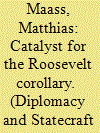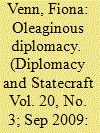|
|
|
Sort Order |
|
|
|
Items / Page
|
|
|
|
|
|
|
| Srl | Item |
| 1 |
ID:
092066


|
|
|
|
|
| Publication |
2009.
|
| Summary/Abstract |
The "Roosevelt Corollary to the Monroe Doctrine of 1904/05" constitutes a landmark in United States foreign policy. However, the 1902/03 Venezuela Crisis-in particular, the arbitration process between the South American country and Germany, Great Britain, and Italy that settled the crisis-led to President Theodore Roosevelt's decision to amend the Monroe Doctrine. The arbitrational award was an important impetus for the corollary because its decision appeared to encourage future European interventions in the western hemisphere. The Roosevelt Corollary was needed to prevent a situation similar to the 1902/03 Venezuela Crisis from occurring again. Strategically speaking, Roosevelt felt the corollary was necessary to uphold the Monroe Doctrine under new circumstances.
|
|
|
|
|
|
|
|
|
|
|
|
|
|
|
|
| 2 |
ID:
092068


|
|
|
|
|
| Publication |
2009.
|
| Summary/Abstract |
On 3 September 1939 the passenger liner Athenia, sailing from Liverpool to Montreal, was sunk by the German submarine U-30 with a loss of 112 lives. This action, while not intended by the German government, was in violation of Germany's commitments under the London Naval Treaty and it complicated its desire to keep hostilities confined to Poland. The British government and Admiralty, confronted with an attack on an unarmed passenger liner within nine hours of the declaration of war, and several freighters shortly thereafter, concluded that the German Navy intended to wage unrestricted submarine warfare. This article shows that as a result of the sinking of the Athenia, the government and the Admiralty implemented convoys within the first week of the war, sooner and more completely than had been intended. Naval ship building priorities were also subsequently adjusted to quickly provide escort vessels for the newly organized convoys.
|
|
|
|
|
|
|
|
|
|
|
|
|
|
|
|
| 3 |
ID:
092071


|
|
|
|
|
| Publication |
2009.
|
| Summary/Abstract |
Although a great deal has been written about British policy in the Middle East in the late 1940s and early 1950s, the reorganization of the Southern flank of Supreme Headquarters Allied Powers Europe after the admission of Greece and Turkey into the North Atlantic Treaty Organisation and the assumption of NATO's naval Mediterranean Command by Britain has attracted little attention. This article analyses British aims and policy on the formation of the Mediterranean Command, the talks between London and Washington concerning the appointment of a Naval Commander-in-Chief, the attitudes of France, Italy, Greece, and Turkey towards British policy, and finally, the establishment of NATO's Mediterranean Command in conjunction with the reorganization of SHAPE's Southern flank. For strategic as well as prestige reasons, Britain tried to retain its traditional dominant eastern Mediterranean position by encouraging the establishment of an Allied naval Mediterranean Command under a British Commander-in-Chief. However, the decline of British military and naval power and political influence meant that Britain secured a compromise settlement which only partially satisfied its aspirations.
|
|
|
|
|
|
|
|
|
|
|
|
|
|
|
|
| 4 |
ID:
092073


|
|
|
|
|
| Publication |
2009.
|
| Summary/Abstract |
During the radical phase of the Cultural Revolution in 1967-1969, China's violation of the diplomatic norms of the international community reached an unprecedented level. Two dozen British diplomats and private citizens on the mainland became de facto hostages of their host government. In response to China's hostage-taking, the British government preferred quiet diplomacy to extreme retaliation such as a rupture of diplomatic relations and economic sanctions. It focused on negotiations through minimal publicity and reciprocal gestures. But in China, the British found a culturally different negotiating partner that was obsessed with principles rather than details. Through a step-by-step negotiating approach recommended by the Sinologists in the British Mission, London was finally successful in securing the release of its detained nationals. The lesson of Britain's quiet diplomacy was a culture-sensitive approach to negotiation and the ability to separate the hostage question from the wider political and economic relationship that would facilitate the resolution of future hostage crises.
|
|
|
|
|
|
|
|
|
|
|
|
|
|
|
|
| 5 |
ID:
092074


|
|
|
|
|
| Publication |
2009.
|
| Summary/Abstract |
United States rapprochement with China should be re-examined by taking into consideration the American negotiating approach towards Beijing regarding the role of Japan, the United States' major Asian ally and China's long-term rival in East Asia. Whilst announcing the Nixon Doctrine, which increased pressure on Japan to strengthen its defense and regional responsibilities, Nixon and Kissinger used the so-called "Japan Card," Japan's possible military resurgence and China's long-term fear of it, as a tacit negotiating tool to justify to Chinese leaders the continued United States military presence in East Asia. This article examines the impact of the United States rapprochement with China on the American negotiating process with Chinese leaders for the continuation of the United States-Japan Security Treaty and to what extent it changed China's policy toward American relations with Japan.
|
|
|
|
|
|
|
|
|
|
|
|
|
|
|
|
| 6 |
ID:
092069


|
|
|
|
|
| Publication |
2009.
|
| Summary/Abstract |
There has been considerable controversy as to the significance of oil in the Lausanne Conference of 1922-1923, in particular British attempts to retain Mosul as part of Iraq. However, as this article explores, the conference also had important implications for the composition of the British-registered Turkish Petroleum Company, which was expected to win the Iraqi oil concession. In the first phase of the conference, the United States observer delegation's stance persuaded the British Government to put pressure upon the British companies involved in the TPC to admit American companies upon the latter's terms. Despite this, in the second phase, the Americans supported the Turkish delegation in its opposition to clauses in the proposed Treaty, which would have guaranteed the rights of the TPC, and forced a British compromise on the issue. The Lausanne Conference played a significant role in the Anglo-American "oil war" of the inter-war period.
|
|
|
|
|
|
|
|
|
|
|
|
|
|
|
|
| 7 |
ID:
092076


|
|
|
|
|
| Publication |
2009.
|
| Summary/Abstract |
Over the past decade, scholars have closely examined the linkage between environmental change, security, and conflict. Severe deforestation, soil erosion, soil salinisation and water-logging, toxic contamination, drought and flooding, and air and water pollution are some of the environmental calamities that can increase international tension and even lead to conflict. What is perhaps more interesting, however, is that reversing the equation is also true. Environmental conservation and cooperative governance between neighbouring states can contribute to regional stability and conflict avoidance. This article suggests the international trans-boundary river agreement between India and Pakistan to manage the Indus River reduces tension and prevents war between the nuclear-armed rivals. During the Kargil crisis in 2001, for example, the trans-boundary river management regime was the most functional bilateral relationship between the two South Asian powers.
|
|
|
|
|
|
|
|
|
|
|
|
|
|
|
|
| 8 |
ID:
092072


|
|
|
|
|
| Publication |
2009.
|
| Summary/Abstract |
Although often considered an objective fact, Britain's "East of Suez role" was actually a rhetorical construction. As such, it was dependent on the continued ability of Britain to "make" that role and other important players to "cast" Britain into it. But the Wilson government's initial support for East of Suez had the paradoxical effect of bringing its coherence into question. Without a British future in Aden, East of Suez was increasingly linked solely to the Far East, where, with the end of Confrontation in 1966, the argument for staying lost much of its force. Other interested Powers were also increasingly unable to cast Britain into the role: the nationalist tide and the United States' tribulations in Vietnam being primary factors. The article thus shows that thinking through the implications of this realisation provides a better understanding of the withdrawal than by resting on economic or domestic political factors alone.
|
|
|
|
|
|
|
|
|
|
|
|
|
|
|
|
|
|
|
|
|